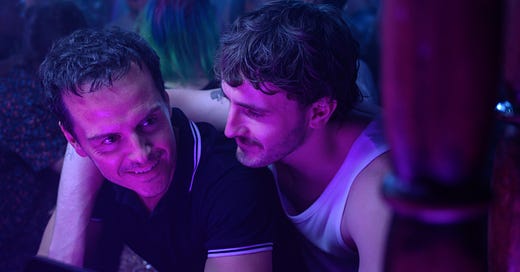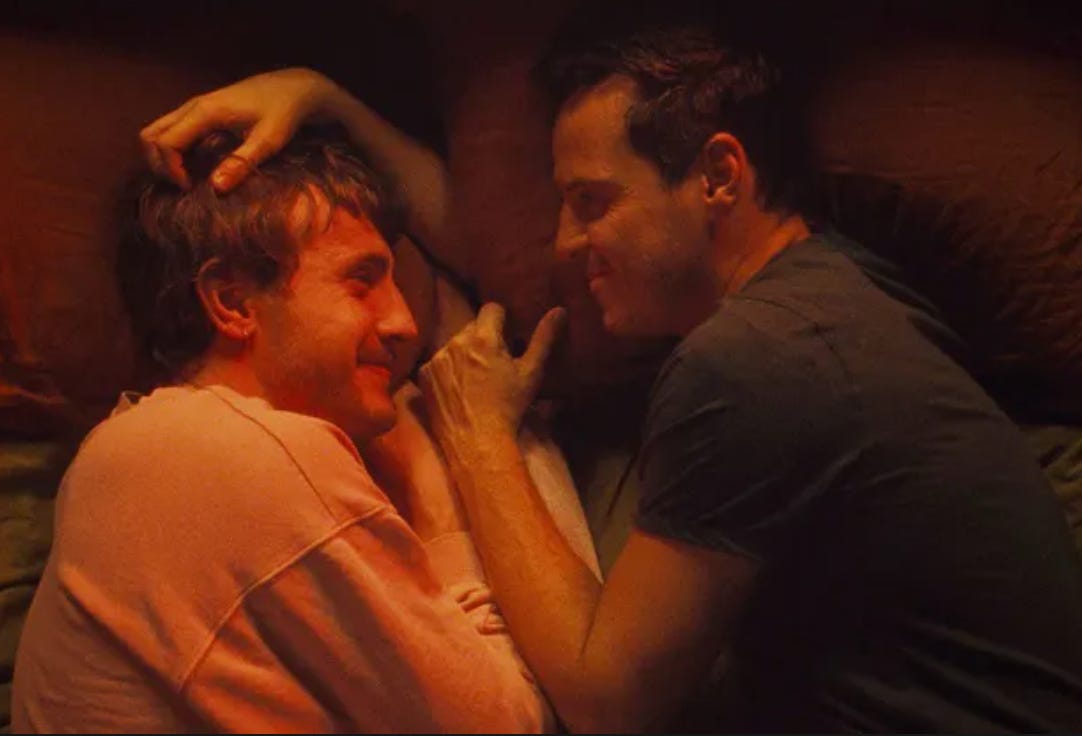“All of Us Strangers” Warns Us About Vampires
“I see dead people” tropes aside, the film has one thing going for it
All of Us Strangers is streaming on Hulu
Grade: B- (I’ve been told you need to watch this film twice to escape the desire to make reason out of it. If you can handle not making sense of pretty much anything, then this film is for you.)
Caveat: Spoilers ahead.
Filmmaker Andrew Haigh (Looking, 45 Years) knows how to move emotion in his actors and Andrew Scott (Fleabag), the lead actor in his latest vehicle, All of Us Strangers, doesn’t need much prompting. He can work several emotions (regret, shame, disappointment, happiness, sadness, relief) into one scene through just the uplift of one eyebrow and the slight twitching of his lips. His performance as Adam, a lonely middle-aged scriptwriter embarking on his latest oeuvre, a true-life account of his parents’ tragic death when he was 11-years-old, is what launches us, the viewers, into his story.
It needs to be stated that the movie demands of us a total abandonment of reality and the acceptance of a fantasy world that forms the basis for the next ~2 hours. Otherwise, you run the risk of spending the entire film trying to maniacally fill in gaping holes in the story and sort out how details don’t line up, only to realize that you’re missing key moments. DM me and we can compare notes. These details will ruin your experience. If you can suspend belief in the existence of how the earthly world operates and the core principle that there is no tangible, physical crossover between the living and the dead, then this movie is for you. If not, you might consider skipping it.
Grief and Catharsis
alt.
An Ode To Orphans
On a day trip to Dorking (his childhood home) from London, where he lives in an unfinished skyscraper of an apartment building which inhabits only one other person named Harry, played by Paul Mescal, Adam follows his father from a field to his home, where his mother is waiting for them. Once there, Adam and his parent embrace as if this is a totally normal thing with the latent acknowledgement that some time has passed, but also with the understanding that it’s not weird at all for a living son to be hanging out in the foyer of his former childhood home with his dead parents, like he just got back from a long weekend in Brighton, soaking in the coast. Also, that at this same home, were Adam happened to pass a few hours before seeing his dad, there was another kid in in the window of the upstairs bedroom looking out at him. This same kid reappears later though on a train ride, so let’s just chalk this up to things we will never fully comprehend.
The film explores Adam’s coming out to his parents, something he never got to do in real life. The curiosity here is that Adam, who is in his late 40s and his parents, played by Jamie Bell (Billy Elliott) and Claire Foy (The Crown), who are frozen in time at the age they were before they died, are even younger than Adam is in the current timeline so when he finally tells them he’s gay, he’s a middle-aged adult having this conversation with his younger adult parents. Trippy, I know.
Where the film shines is in the writing and the beautiful and moving acting that transforms Adam and his mum and dad into a truly believable family unit - one that is actively healing and loving one another in all the ways that, as children, we want and crave from our parents. This is especially true for children who’ve lost a parent. As Adam’s return visits attest to, there’s a hunger and yearning to be seen for who he is now and to live out the “one more time(s)” or “firsts” with his parents that he never got to have in real life. For anyone that’s lost a parent at any age, it’s gutting to watch, but for Adam, living quietly as a gay man, the loss is even more profound. His secure attachment was severed so young and without a lifeline or tools to cope with the trauma, he’s been stuck in a loop. Perhaps, he still is.
In one particularly memorable scene with his father (Bell, who does some of his best acting), the two discuss why his father never bothered to knock on the door when he heard Adam crying, a victim of constant bullying (“They'd call me a girl. Refuse to play with me. Flush my head down the toilet and flick drawing pens at my face.”) His father relays regret and shame. Adam forgives him, but not before they have a very honest heart-to-heart:
Adam: Why didn't you come into my room if you heard me crying?
Dad: Why didn't you tell me what was happening at school?
Adam: No, you answer first. You can be honest.
Dad: I didn't want to think of you as the type of boy that other lads picked on. I knew that if I was at your school, I'd have probably picked on you too. I can't imagine that's very nice to hear.
Adam: I think I always knew that anyway. It's probably why I never told you what was happening to me.
There are almost tears involved - ones that don’t quite make it to the cheek but form in the eye.
In a cutting line ahead of this conversations, Adam tells his dad something that sticks with him to this day:
Adam: You told me not to cross my legs like a woman.
Dad: Did I?
Adam: Yeah I still think about it every time I cross my legs.
Adam’s mum deals with the news of him being gay in a much different way. She’s upset and concerned for what that means for Adam out in the world and remember she’s also from the world of the 80s where AIDs is rampant. When Adam tries to tell her things are different now, she doesn’t fully believe him, and you get the sense that Adam doesn’t fully buy into this either. Why else would he decide to live his life so removed from others, so detached and lonely?
Hope is Harry
As Adam opens up and blossoms under his parents’ acceptance and his feeling of belonging finally taking root, he seeks out intimacy in the form of the one other person living in his giant apartment complex. Harry is younger and more assertive with entering into a physical relationship with Adam, but Adam slowly opens up to Harry and every moment he’s not with his parents on screen, he’s spending with him. In between K-holes (Ketamine induced trips) at clubs and watching shows together on the couch, Adam and Harry form a deep bond and as viewers, we are invested in their relationship because of the sincerity of their growing connection. They both harbor trauma-filled pasts with people close to them who don’t understand them (Harry: I've always felt like a stranger in my own family.”) and are seemingly optimistic about having one another, finally meeting someone who gets them.
Blood Sucking Beings
Frankie Goes to Hollywood’s “Power of Love” and the Pet Shop Boy’s cover of “Always on My Mind” comprise the soundtrack. I applaud Haigh’s choice to have music solely sourced from gay musicians, especially because, based on the singers he chose, it means I get to enjoy 80s jams. Notably, the line below is one that Harry echoes in the beginning in his “meet cute” with Adam, when he shows up at Adam’s door in the hopes that Adam will avail him of “the vampires” at his door. He’s looking for an out - for company. He doesn’t want to be alone. In the background, we hear the words of “Power of Love” which reverberate well into the end of the film as Adam embraces Harry.
“I'll protect you from the hooded claw. Keep the vampires from your door”
For both Adam and Harry, the threat of the vampires is always there based on who they are and the way society condemns them. Their mutual salvation lies in the power of their love.
In summary, the acting and writing are the good stuff. The tackling of sexuality, identity, trauma and acceptance are compelling. It’s quite possible that in the adaptation from the 1987 Japanese novel, Strangers (Taichi Yamada), to its onscreen, cinematic format, the story was shorted. I found myself getting easily distracted by artifacts that could have been red herrings (e.g. the guy from the nightclub appears on the train on a different day), but nonetheless took on a life force all their own. This took away from my appreciation of all the good and for a movie of this caliber, that seems a waste.
So What is Good Out There?
“True Detective: Night Country” - A Tale of Two Plots
The format for this review - True Detective: Night Country (Season 4) - is a discussion with fellow pop culture and Prestige TV (HBO) fan Patrick Regal of Feature Presentation Video. We hope you enjoy reading it as much as we enjoyed writing it.
"Anatomy of a Fall" Derives Its Power From Nuance
“Men are afraid that women will laugh at them. Women are afraid that men will kill them.” - Margaret Atwood In the French film Anatomy of a Fall (2023), available for streaming (to rent or buy) at your preferred streamer, director Justine Triet subverts traditional tropes of female and male identity. She does this via the narrative of a writer couple, Sa…








